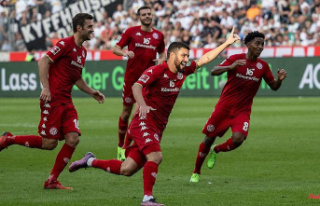Before the parliamentary elections in Italy, Lega boss Salvini dared to come out with criticism of the western Russia sanctions: The high prices mainly hit Italians and not the Kremlin, he says. The right-wing poll favorite Meloni vehemently contradicts her alliance partner.
Italian right-wing populist Matteo Salvini has questioned the EU sanctions imposed on Russia over the Ukraine war. Several months have passed and people are "paying their bills twice or four times over" while after seven months of war "Russia's coffers are filling up with money," the head of the far-right Lega party told RTL radio. Salvini's most important ally at the moment, the head of the ultra-right party Fratelli d'Italia (FDI) Giorgia Meloni, distanced herself from his statements.
Salvini questioned the success of the sanctions. It is "important to reconsider the strategy to save jobs and businesses in Italy," he said. The head of the Democratic Party (PD), Enrico Letta, one of Salvini's main opponents in the ongoing campaign for the parliamentary elections on September 25, countered his statement with the words: "I think Russian President Vladimir Putin could not have said it better."
Salvini's ally Meloni, whose party is currently leading the polls, reiterated her support for Ukraine at the sidelines of an economic forum in Cernobbio on Lake Como. "What would the West do if Italy stopped sending weapons to Ukraine and stopped participating in sanctions?" Meloni said. "Nothing, the weapons would continue to be delivered."
If Italy "abandoned its allies", "nothing would change for Ukraine, but a lot would change for us," added Meloni. "A serious country that wants to defend its own interests must have a credible position." Unlike Salvini, Meloni and her party have always sided with Ukraine in recent months.
During his own appearance in Cernobbio, Salvini later put his statements into perspective. "If we want to proceed with sanctions, then let's do it, we want to protect Ukraine," he said. "But I don't want us to harm ourselves instead of harming the sanctioned."
Mara Carfagna, Minister for southern Italy, accused Salvini in Cernobbio of allowing the Kremlin boss to exploit him. "When I hear Salvini talking about sanctions, it's like listening to Putin's propaganda," she said. She is "worried about a country like Italy that winks at Russia," said Carfagna. The politician was a member of former Prime Minister Silvio Berlusconi's Forza Italia party until July, but left in protest at its complicity in overthrowing Mario Draghi's government.
The Salvini-Moscow ties are a concern in Italy, particularly since the Russian invasion of Ukraine, and could pose a campaign problem for the right-wing coalition of Lega, Forza Italia and Giorgia Meloni's far-right Fratelli d'Italia party. In the past few weeks, statements by ex-Russian President Dmitry Medvedev, among others, have sparked a debate in Italy about Moscow's possible influence on the elections.
Both Salvini's Lega and Berlusconi's Forza Italia have longstanding ties to Russia and Russian President Vladimir Putin. In 2017, the Lega signed a cooperation pact with Putin's United Russia party. Salvini, who in the past has liked to pose in T-shirts with a portrait of Putin, recently emphasized that Moscow has not the slightest influence on the elections in Italy.












